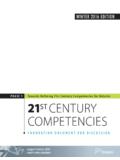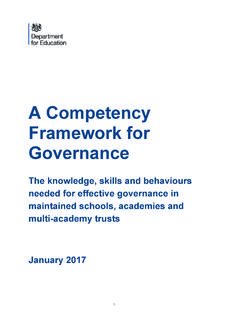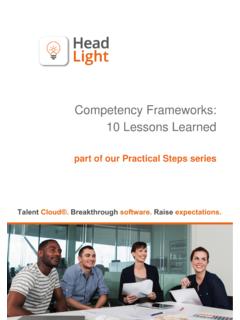Transcription of Definition and Selection of Competencies: …
1 DeSeCo Annual Report 2001/spring 2002 OECD. OCDE. Definition and Selection of competencies : theoretical and conceptual Foundations (DeSeCo). Annual Report 2001/spring 2002. Background ..2. Objectives ..2. 2001 Activities ..3. DeSeCo publication release ..3. Country Contribution Consultation and Exploration of International DeSeCo-related Additional Expert Papers ..4. Discussion 2002 Activities ..5. The 2nd International DeSeCo Symposium, 11-13 February 2002 ..5. Strategy paper and final Contact Address ..7. Source OECD/SFSO/DeSeCo DeSeCo Annual Report Page 1. DeSeCo Annual Report 2001/spring 2002 OECD. OCDE. Background The OECD Program Definition and Selection of competencies : theoretical and conceptual Foundations (DeSeCo) was initiated at the end of 1997 and managed by the Swiss Federal Statistical Office with support from the United States Department of Education, National Center for Education Statistics. DeSeCo is part of OECD's effort within the framework of INES to continue work in the area of competencies and skills of the youth and adult population and to develop over time a coherent strategy for defining, selecting and measuring competencies and skills.
2 Context The complexity of the demands generated by an increasingly interdependent, changing and conflictual world places the objectives of education and the strategies to achieve education goals in center stage of the debate on broad educational reform. In line with a growing concern about the adequacy and quality of education and training and the actual return on public educational expenditure, there has been since the mid-1980s an increased policy interest in comparable outcome indicators in the education field. In fact, measuring the quality of education outcomes, estimating economic and social returns to learning, and identifying key determinants to educational success is an ongoing discussion topic that stimulates keen interest around the world. This interest in new information raises important questions about what is most needed. Beyond basic skills such as reading, writing, and calculating, what competencies are needed for the individual to lead an overall successful and responsible life and for contemporary society to face present and future challenges?
3 What are the normative, theoretical , and conceptual foundations for defining and selecting a limited set of the most relevant competencies ? These questions are the basis for an international and interdisciplinary endeavor conducted under the auspices of the Organisation for Economic Co-operation and Development (OECD) and led by the Swiss Federal Statistical Office (SFSO). This project entitled Definition and Selection of competencies : theoretical and conceptual Foundations (DeSeCo) has been set up to develop research in the area of competencies . Objectives DeSeCo seeks in collaboration with ongoing OECD assessment programs, to analyze the theoretical foundation, the rationale of the Definition and Selection process of key competencies and their relationship to the social and economic environment. Further it aims to provide guidelines for future developmental work for the assessment of broad human competencies in an international context. The main objectives of DeSeCo are: - To develop normative, theoretical , and conceptual foundations for defining and selecting key competencies .
4 The program seeks through an interdisciplinary scientific approach, within an international context, to develop a common, overarching theoretical framework for the identification of the competencies needed OECD/SFSO/DeSeCo DeSeCo Annual Report Page 2. DeSeCo Annual Report 2001/spring 2002 OECD. OCDE. for individuals to lead an overall successful and responsible life and for society to face the challenges of the present and the future. The construction of future measures in the form of relevant indicators should be based on a refined and solid, theory-based foundation. - To develop reference points for the development and understanding of future indicators of competencies and for the validation of education indicators, and to provide a basis for more accurate and appropriate interpretation of empirical results. The work of the program will provide a resource for the process of defining and selecting key competencies , as well as for the development and understanding of future measures aimed at producing relevant indicators of skills and competencies .
5 For this it is crucial to support an iterative process between conceptual and empirical work through close linkages with INES-related activities in the domain of competencies . - To respond, in the long term, to information needs of policymakers. The DeSeCo Program is embedded in the long-term strategy of INES to develop a broad basis for international comparisons of education outcomes and to develop relevant and theoretically based criteria for the successful evaluation of education systems and learning outcomes more generally. 2001 Activities DeSeCo publication release Defining and Selecting Key competencies , published in summer 2001 by Hogrefe & Huber, describes the rationale and main features of DeSeCo, as well as the challenges and issues at stake when defining and selecting key competencies . It contains perspectives on competencies from different academic disciplines and from various areas of policy and practice, and will serve as a primary source for ideas to guide and enrich the discussion and reflection on competencies planned for the February 2002 Symposium.
6 Copies of the book may be obtained at Country Contribution Process A central issue of the DeSeCo Program is that the Definition and Selection of key competencies is largely a process of negotiation among various stakeholders. National input into the process is an important step if a consensus among countries concerning key competencies is to be reached. During 2001, the Country Contribution Process initiated in 2000 was conducted. A synthesis report was prepared by Uri Trier, which was disseminated in conjunction with preparations for the 2nd International Symposium. The main objectives of the CCP were to identify in the national context competencies that are considered most relevant in and across various social fields, to understand the means or mechanisms by which the Definition and Selection of key or relevant competencies are arrived at in national-level initiatives, to provide information concerning DeSeCo-type country activities and perspectives, and to obtain feedback from the countries involved in the CCP on the relevance of the DeSeCo Program and findings in their view.
7 Twelve countries (Austria, Belgium, Denmark, Finland, France, Germany, the Netherlands, New Zealand, Norway, OECD/SFSO/DeSeCo DeSeCo Annual Report Page 3. DeSeCo Annual Report 2001/spring 2002 OECD. OCDE. Sweden, Switzerland, and the US) prepared reports based on their national experiences with issues related to competencies . This material will be discussed at the 2nd International Symposium in Geneva, and is currently available on DeSeCo's Web page. Consultation and Exploration of International DeSeCo-related Activities In complement to the Country Contribution Process, DeSeCo sought to examine initiatives, programs and projects related to questions considered regarding competencies that either have been undertaken in recent years or that are currently being planned by international organizations other than the OECD. Organizations such as UNESCO and its Institute of Statistics, the World Bank , the European Commission, and the United Nations Development Programme were invited to provide information regarding their work on competencies and the issues that surround them.
8 These ideas were presented in a panel at the 2nd International Symposium. Additional Expert Papers During 2001, DeSeCo commissioned and received three additional expert papers to complement and extend the examination of key competencies represented in the book and prior work of the project. The papers submitted include a description of the issue of competencies from an education research and human development perspective, an examination of competencies for participation in civic and political life in contemporary democratic societies, and a strategy paper intended to examine the topic of which methodologies are most appropriate for development work leading to key competency indicators that is rooted both in scientific theory and interpretable in policy terms. A perspective from education research Daniel Keating, professor at the University of Toronto, provided a paper that discusses - on the basis of the relevant research literature in the field of education/education science - the various disciplinary contributions and the three generic key competencies proposed in the contribution to the OECD INES 4th General Assembly with regard to the overarching questions and objectives guiding the DeSeCo Program Based on existing theory and research in education, the paper addresses key competencies at the level of observable entities and thus goes beyond the abstract level of the sets of key competencies suggested by experts representing other disciplines.
9 competencies for participation in civil society In keeping with DeSeCo's commitment to an iterative process between theoretical work and empirical studies, this paper, prepared by Barbara Fratczak-Rudnicka, Warsaw University, and Judith Torney-Purta, University of Marylandreviews the conceptual basis for the competencies identified in the IEA Civics Education study in comparison to the approach to key competencies and the generic key competencies proposed in the DeSeCo contribution to the General Assembly. Key competencies and challenges to their assessments Tim Oates, from the Qualifications and Curriculum Authority in London, prepared a paper designed to identify the potential of DeSeCo's work for contributing to developing OECD/SFSO/DeSeCo DeSeCo Annual Report Page 4. DeSeCo Annual Report 2001/spring 2002 OECD. OCDE. internationally comparable indicators of key competencies for all within OECD's INES. program. The paper is based on a reflection on DeSeCo's current work with regard to the overarching research questions and on the topic of which methodologies are most appropriate for development work leading to key competency indicators.
10 Teaching and learning of the key competencies Andrew Gonzci, from the University of Technology in Sydney, submitted a paper, Teaching and learning of the key competencies , for the International symposium. He focused on the issues surrounding the learning and development of key competencies both within and out- side the formal education system. The paper includes an analysis of both workplace learning and vocational and professional education (in formal institutions) and their implications for lifelong learning. Discussion Paper To synthesize the work developed from the Country Contribution Process and expert papers commissioned during this and previous years, and taking into consideration the commentary of experts working in the field of competencies , DeSeCo prepared a Discussion Paper to pre- sent at the Symposium planned for February 2002. The paper outlines the major themes and theses developed from a synthesis of the work of DeSeCo since inception, delineates con- ceptual elements of key competencies and the issues that surround them, and includes a proposed framework for the Definition and Selection of key competencies and a description of the constellations into which key competencies may be situated.









